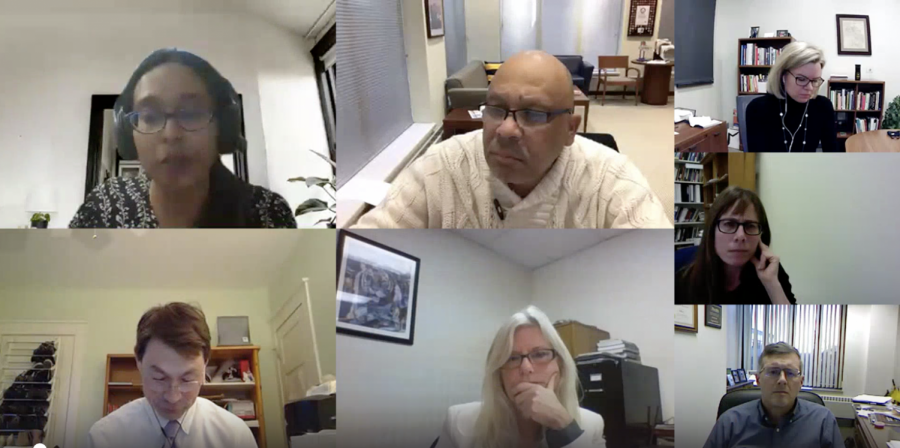Marquette University’s Academic Senate hosted a meeting Dec. 9 to discuss recommendations that will aid in maintaining a good fiscal standing beginning 2022 following potential financial shortfalls.
Heidi Bostic, co-chair of the College, Administrative and Shared Services work group, started off the meeting by discussing restructuring recommendations that would create more efficiency and cut costs.
Bostic addressed a recommendation to eliminate around 5-10 deans and assistant deans across campus.
“The idea is that if we have a colleague that is an associate dean role they could go back to a faculty role and also do more teaching, which would be an additional savings.”
Although Bostic and her work group are not yet ready to address recommendations for college restructuring, as there are still many ideas up in the air. She assures viewers of her group’s mission.
“We are looking at preserving our academic excellence and our mission, while figuring out ways to reduce administrative costs,” Bostic said.
She went on to address the collaboration her group has been doing with the programming work group, as these issues are multifaceted and require deliberation across all sectors.
“There are a lot of interdependencies, if the programs group comes up with particular recommendations about closing/combining programs, that could influence some of our recommendations about what makes sense in terms of academic structure,” she said.
Recommendations for significant restructuring/closing of programs were also addressed at the meeting, as the program offerings work group reviewed three categories of proposal: graduate programs, program consolidations and undergraduate majors.
Amber Wichowsky, co-leader of the program offerings work group, discusses specifics regarding potential changes in undergraduate majors.
“We began with a preliminary examination of programs with fewer than 35 majors,” Wichowsky said. “Recommendations for further inquiry regarding closure or significant restructuring include Theater Arts, Innovation and Entrepreneurship, Clinical Laboratory Sciences, Classics, German and French.”
Wichowsky then discussed how these changes will be hashed out amid the work groups, departments, deans and provosts.
“Our recommendation is for departments to elaborate action plans in consultation with the deans and with our program offerings work group, to then inform a long term set of recommendations that would be submitted to the provost at the end of the upcoming spring semester,” Wichowsky said.
Tim Melchert and Sarah Felder, co-leaders of the Discretionary/Other Expenses work group, then took the stage to discuss recommendations for reducing discretionary spending within the next 6-12 months, and the key principles that should be maintained while doing so.
“Discretion for specific cuts should be made by the local units – local departments, local college offices, ext. – this is one of the guiding principles we are recommending,” Melchert said.
In addressing various reductions that would affect all sectors of the Marquette community, Feldner assures viewers that the discussions for these reductions are ongoing.
“We would like to revisit these in a year or semester because on all of these things there are going to be consequences, there are a lot of ROI’s that you can’t find on a spreadsheet,” Feldner said.
Jeanne Hossenlopp, co-leader of the Research work group, went on to discuss how – although her group is still at the beginning stages of research – they will continue to put the principles of diversity, equity and inclusion, as well as collaboration, at the center of their mission.
“We want to make it clear that we view this as a building mission not a cutting mission,” Hossenlopp said. “All forms of research and scholarship are valued and even with strategic areas identified we have to come up with a plan to support individual faculty who are working outside of those interdisciplinary themes.”
Michelle Mynlieff, co-leader of the Teaching work group, goes on to discuss the approach her group has taken regarding class size and teaching load.
“We are looking at this with a balance of mission, pedagogy, USNWR ranking, and financial considerations.”
In regard to class sizes, Mynlieff discusses how there should be criteria that needs to be followed in order to maintain Marquette’s national ranking while making budget reductions. However, the departments should be the ones who implement this criteria with whichever strategy they see fit.
“Because the disciplines are so different, this shouldn’t be determined by us. It should be determined by the departments with their deans,” Mynlieff.
Senior Vice President and Chief Operating Officer Joel Pogodzinski finishes off the meeting by discussing the budget for the fiscal year of 2022.
Pogodzinski addresses a common question regarding why there will be an elimination of 225 staff and faculty lines amid a three percent operating surplus.
“We have a confluence of measures that are coming that create risks for institutions like Marquette, and others.” Pogodzinski said. “The goal of the board is to create a set of guidelines that create sustainability so that we can be academically strong, have a strong Catholic Jesuit identity, and have fiscal health.”
This story was written by Claire Driscol. She can be reached at [email protected]

